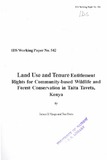Land Use and Tenure Entitlement Rights for Community-based Wildlife and Forest Conservation in Taita Taveta, Kenya

View/
Date
2013Author
Njogu, James G
Dietz, Ton
Type
Working PaperLanguage
enMetadata
Show full item recordAbstract
This paper, discusses land use and tenure in terms of entitlement rights. Land is viewed .
as the basic resource through which other biological resources - in this case, wildlife
and forests- are owned, used, managed and contested. In this regard, key issues in the
concept of entitlement rights are highlighted. In this context, the paper then discusses
briefly land, land use and tenure in Kenya. It narrows down to analyse land use and
tenure in Taita Taveta District, describing the present tenure status with the aim of
identifying 'who owns which land and what use they make of it' .The rationale for the
establishment and subsequent demarcation of the conservation areas (Tsavo National
Park, existing and planned sanctuaries and various forest reserves) is also reviewed,
with a focus on entitlement rights. Finally,the paperdemonstrates that there is competition
for land between the local communities, and between them and wildlife and forest
conservation. This competition is viewed as the main reason for biodiversity loss and
human-wildlife conflict. Therefore, clear entitlement rights to land -ownership, use and
interventionism - would lead to fewer contestations and competition, ameliorate loss of
biodiversity, human-wildlife conflict and facilitate socio-economic development.
